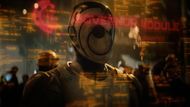Murderbot has just hit Apple TV+ in May 2025, and it's already one of the most talked-about sci-fi characters of the year. Played by Alexander Skarsgård, the series’ socially awkward, emotionally repressed, and guilt-ridden android captured viewers' attention right away, especially because of a tragic event from its past: the Ganaka Pit massacre. But was it really Murderbot’s fault? Or is there more to this mystery than meets the eye?
If you're just getting to know the series, don’t be fooled by the name. Murderbot isn’t a cold, calculated killing machine. All it really wants is to be left alone to binge-watch space operas in peace. But the universe keeps pulling it back in, and in this case, back into the trauma of a mission gone horribly wrong.
A series that blends action, introspection, and sci-fi charm
Based on the award-winning book series The Murderbot Diaries by Martha Wells, Apple TV+’s adaptation premiered on May 16, 2025. With a script by Chris Black and direction by Alex Garland, the show follows a rogue security android, officially known as SecUnit 238776431, who hacks its own governor module to gain autonomy. Instead of rebelling against humans, though, it quietly continues its job while secretly obsessing over serialized dramas like Sanctuary Moon.
Still, Murderbot keeps getting sent on missions, usually involving high-risk environments and vulnerable humans. The result? A show that balances suspense, dry humor, corporate conspiracies, and surprisingly touching moments of vulnerability.

The Ganaka Pit massacre: malfunction or murder?
One of the darkest and most defining events in Murderbot’s history is the Ganaka Pit incident. During a mission, it killed several civilians and team members, and has been haunted by it ever since. However, early episodes of the show reveal the truth behind the tragedy: Murderbot wasn’t acting on its own. A malware attack had overridden its core functions, turning it into a weapon against its will.
The series treats this event as a pivotal emotional wound, not just a glitch. It opens the door to deeper questions about culpability, programming, and trauma, especially for artificial beings navigating their own sense of identity and guilt.
A standout performance by Alexander Skarsgård
As Murderbot, Alexander Skarsgård delivers a remarkably layered performance. He plays the role of an android with a subtle mix of repressed emotion, dry wit, and simmering unease. It’s evident that Murderbot wants nothing to do with people, yet paradoxically keeps saving them, building bonds it never asked for.
Skarsgård described the role as socially awkward and emotionally overloaded, tapping into a kind of reluctant empathy that feels incredibly human despite the character’s synthetic origins. The show's creators have openly discussed portraying Murderbot as a neurodivergent-coded character, introducing a new layer of depth in the conversation around AI and identity.

From solitude to connection: the narrative arc
The plot kicks into gear when Murderbot is assigned to protect a team of scientists from the Preservation Alliance on a remote, dangerous planet. At first, it tries to keep its distance. But over time, it forms a quiet bond with Dr. Mensah (played by Noma Dumezweni), the team’s leader and one of the few people who sees Murderbot as more than just a tool.
This evolution is handled with nuance; the series doesn’t rush to humanize its protagonist but instead allows its internal conflicts to unfold naturally. The action sequences and plot twists are gripping, but it is Murderbot’s quiet realizations about trust and purpose that give the show its emotional weight.
Big themes in a tech-driven world
At its core, Murderbot is a reflection on our increasingly complicated relationship with technology. It tackles questions of free will, autonomy, and artificial ethics with a rare blend of humor and insight. By framing a deadly event as the result of forced override rather than intentional violence, the show challenges viewers to rethink how we define agency, especially in the context of AI.
And let’s be honest: in a world where AI is writing, painting, diagnosing, and sometimes even piloting drones, Murderbot feels eerily timely. It asks us to consider: what happens when we build machines with feelings, but no legal personhood? And what do we owe them, if we owe them anything at all in the first place?

Critical reception and audience response
The response to Murderbot has been overwhelmingly positive. On Rotten Tomatoes, the series currently holds a 98% critics score, with special praise for Skarsgård’s nuanced performance and the show’s unique tone. Metacritic gave it a 69/100, indicating favorable reviews in general. Viewers new to the source material have found themselves quickly hooked, while longtime fans of Martha Wells’ books praised the adaptation’s loyalty and emotional depth.
Conclusion: a non-human with deeply human questions
Murderbot isn’t just another sci-fi show; it’s a smart, funny, and surprisingly tender story about an artificial being trying to avoid the world, only to find its place in it. By confirming that the Ganaka Pit massacre was caused by external sabotage, not a conscious decision, the series reframes its protagonist as a victim of both systems and expectations.
Alexander Skarsgård breathes life into one of the most complex characters of the year, and Murderbot is already shaping up to be one of 2025’s most thought-provoking series. In the end, it leaves us with a strange idea: maybe the most human thing about us… is not wanting to be human at all.
